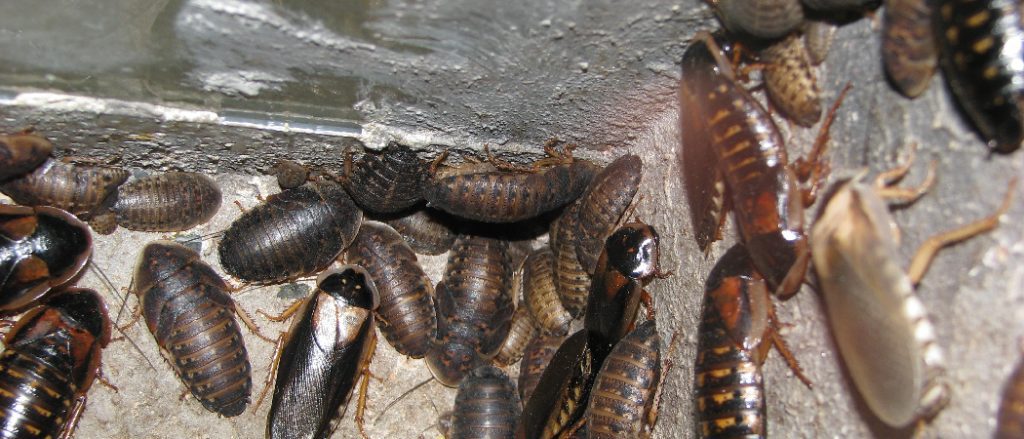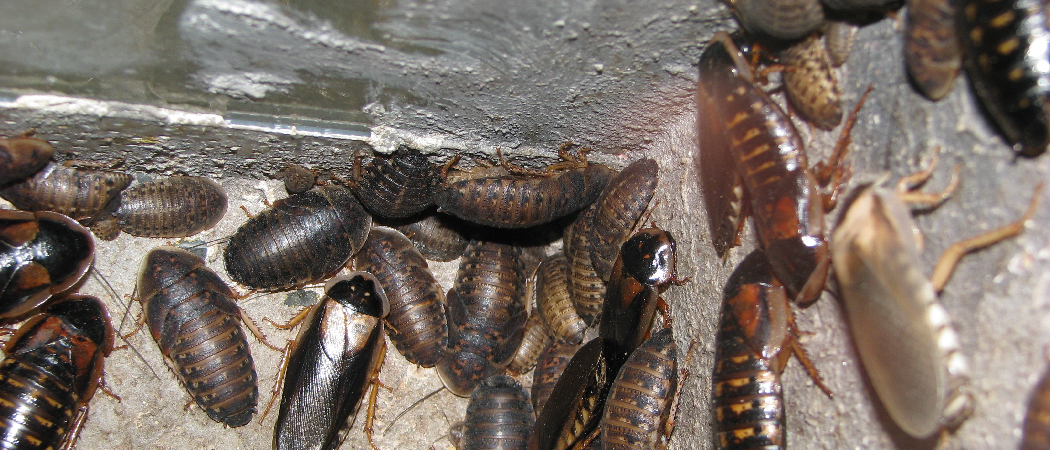To keep Dubia roaches, provide a spacious enclosure with proper ventilation, humidity, temperature, and food sources, and regularly clean the habitat to maintain cleanliness and prevent infestation. Dubia roaches are popular feeder insects for reptiles and other pets due to their high nutritional content and ease of maintenance.

These roaches, also known as the Guyana orange spotted roach, originate from Central and South America. Keeping Dubia roaches may seem daunting at first, but with the right setup and care, it can be a rewarding experience. This article will guide you through the essential steps to ensure the well-being of your Dubia roaches.
By adhering to proper habitat requirements, feeding schedules, and maintenance practices, you can confidently keep a thriving colony of Dubia roaches as a reliable source of nutrition for your pets.

Credit: www.amazon.com
Setting Up A Dubia Roach Enclosure
Setting up a proper enclosure for your Dubia roaches is crucial for their well-being and breeding success. With the right setup, you can create an environment that closely mimics their natural habitat, ensuring their health and providing optimal conditions for growth. In this article, we will guide you through the process of choosing the right enclosure, creating the ideal environment, and providing essential hiding spots and substrates.
Choosing The Right Enclosure
When it comes to selecting an enclosure for your Dubia roaches, it’s important to keep their needs in mind. Opt for a sturdy and escape-proof container that provides enough space for the roaches to crawl and breed comfortably. A plastic or glass enclosure with secure locking mechanisms is ideal to prevent any potential escapes.
Consider the size of your colony when determining the appropriate size of the enclosure. As a general rule of thumb, a 10-gallon glass terrarium can accommodate a colony of around 1,000 Dubia roaches. However, if you plan on growing a larger colony, you may need a larger tank or multiple smaller enclosures.
Avoid using enclosures with mesh or wire openings, as the nymphs can easily escape through them. Additionally, provide adequate ventilation by drilling small holes near the top of the enclosure to maintain a proper airflow.
Creating The Ideal Environment
The ideal environment for Dubia roaches involves maintaining specific temperature and humidity levels. Aim for a temperature range between 80°F and 95°F (27°C and 35°C), with a humidity level around 40% to 60%. This can be achieved by using a heat mat or a heat lamp in combination with a hygrometer to monitor the humidity.
Line the bottom of the enclosure with a substrate that retains moisture, such as peat moss or coconut fiber. This will help maintain humidity levels and provide a comfortable living surface for the roaches. Ensure the substrate is around 1 to 2 inches deep, allowing the roaches to burrow and hide.
Providing Hiding Spots And Substrates
Dubia roaches are nocturnal insects that prefer dark and secluded areas. To replicate their natural habitat, offer plenty of hiding spots within the enclosure. You can achieve this by using cardboard tubes, egg cartons, or pieces of bark. These materials provide hiding spots and climbing opportunities for the roaches.
Additionally, provide a moisture source for your roaches by placing a shallow water dish filled with clean water inside the enclosure. This will not only keep them hydrated but also help maintain humidity levels.
By following these guidelines, you can set up an optimal Dubia roach enclosure that meets their needs for comfort, security, and breeding success. Creating a suitable environment and providing hiding spots and substrates will ensure the well-being and continued development of your Dubia roach colony.

Credit: thegeckopia.com
Feeding And Nutrition
When it comes to keeping Dubia roaches, providing them with a suitable diet is crucial for their overall health and well-being. Feeding and nutrition play a vital role in their growth, reproduction, and overall size. In this section, we will discuss the various aspects of feeding and nutrition for Dubia roaches, including choosing the right food, establishing a feeding schedule, portion sizes, and supplementing their nutritional requirements.
Choosing The Right Food
Feeding Dubia roaches a well-balanced and nutritious diet is essential for their optimal growth and development. While these insects are known to be opportunistic feeders and can consume a wide variety of foods, it’s important to choose nutrient-rich options that offer a good balance of protein, carbohydrates, vitamins, and minerals.
Here are some suitable options for their diet:
- Fruits and vegetables: Dubia roaches benefit from a diet rich in fresh fruits and vegetables. Some good options include apples, oranges, carrots, squash, and leafy greens. These provide essential vitamins, minerals, and fiber.
- Protein sources: Dubia roaches require ample amounts of protein for growth and reproduction. You can provide them with high-quality protein sources such as dry dog food, fish flakes, cereal, or chicken feed. These options are readily available and help meet their protein requirements.
- Water: Always ensure a source of clean and fresh water is available to Dubia roaches. Use a shallow dish with a sponge or cotton ball to avoid drowning.
Feeding Schedule And Portion Sizes
Establishing a regular feeding schedule is essential for maintaining the health and well-being of your Dubia roaches. As with any insect, overfeeding or underfeeding can have negative consequences.
Here are a few tips to consider when it comes to their feeding schedule and portion sizes:
- Feed adult Dubia roaches every 2-3 days.
- Offer smaller, more frequent meals to younger roaches.
- Ensure that the amount of food provided is consumed within 24-48 hours.
- Monitor their consumption to prevent overfeeding and avoid the growth of mold or harmful bacteria.
Supplementing Nutritional Requirements
Although Dubia roaches can obtain most of their nutritional requirements from their primary diet, it is essential to provide additional supplementation to ensure they receive all the necessary nutrients.
Here are some suitable supplements for Dubia roaches:
- Calcium: Dusting their food with a calcium supplement, such as calcium carbonate powder, helps fulfill their calcium requirements. This is especially important for breeding females and growing nymphs.
- Vitamins: You can also provide a commercial reptile vitamin supplement to ensure a balanced nutrient profile. The supplement should contain essential vitamins such as A, B complex, C, and D3.
Remember that providing a diverse and well-rounded diet, establishing a regular feeding schedule, and supplementing their nutritional requirements are crucial steps in keeping your Dubia roaches healthy and thriving.

Credit: www.amazon.com
Frequently Asked Questions For How To Keep Dubia Roaches
How To Care For Dubia Roaches?
To care for Dubia Roaches, provide a warm, well-ventilated enclosure with hiding spots and a water source. Feed them a balanced diet of fresh fruits, vegetables, and high-quality insect food. Regularly clean the enclosure to maintain hygiene and prevent odor.
Avoid direct contact with Dubia Roaches as they may bite or become aggressive.
What Are The Ideal Temperature And Humidity For Dubia Roaches?
Dubia Roaches thrive in temperatures ranging from 80-90°F with a humidity level of 40-60%. Use a heat source like a heat mat or heat lamp to maintain the temperature. Proper humidity can be achieved by misting the enclosure regularly, but make sure it doesn’t become too damp to prevent mold or bacterial growth.
How Often Should I Feed My Dubia Roaches?
Feed your Dubia Roaches every one to two days. Offer a variety of foods such as fresh fruits, vegetables, and commercial insect food to ensure a balanced diet. Avoid overfeeding to prevent uneaten food from rotting and causing hygiene problems.
Monitor their food consumption to determine the right feeding frequency.
Conclusion
Keeping Dubia roaches as pets requires proper care and attention. By following the guidelines mentioned in this blog post, you can ensure the well-being of these amazing creatures. Remember to provide them with a clean and suitable habitat, a balanced diet, and regular maintenance.
With patience and dedication, you can enjoy the fascinating experience of raising and observing these curious insects. Happy roach keeping!


